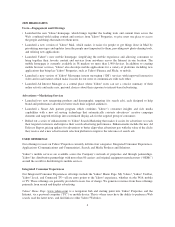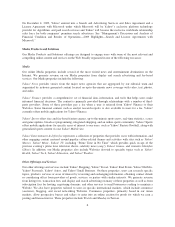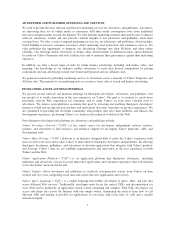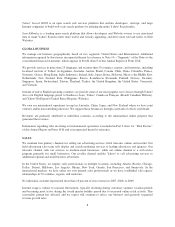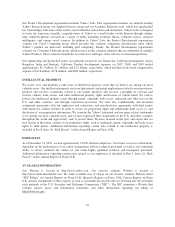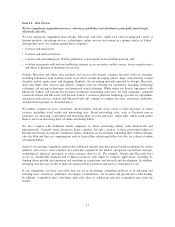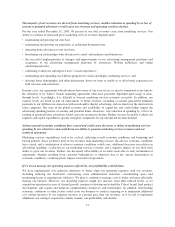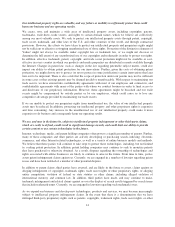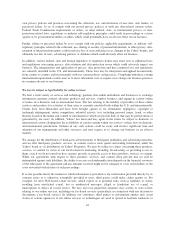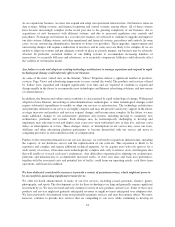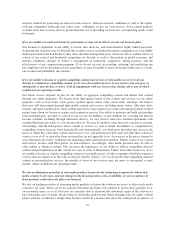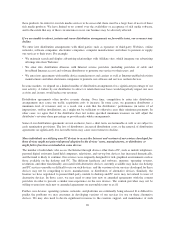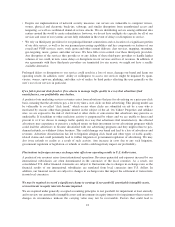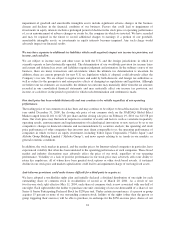Yahoo 2009 Annual Report Download - page 22
Download and view the complete annual report
Please find page 22 of the 2009 Yahoo annual report below. You can navigate through the pages in the report by either clicking on the pages listed below, or by using the keyword search tool below to find specific information within the annual report.Our intellectual property rights are valuable, and any failure or inability to sufficiently protect them could
harm our business and our operating results.
We create, own, and maintain a wide array of intellectual property assets, including copyrights, patents,
trademarks, trade dress, trade secrets, and rights to certain domain names, which we believe are collectively
among our most valuable assets. We seek to protect our intellectual property assets through patent, copyright,
trade secret, trademark, and other laws of the U.S. and other countries of the world, and through contractual
provisions. However, the efforts we have taken to protect our intellectual property and proprietary rights might
not be sufficient or effective at stopping unauthorized use of those rights. Protection of the distinctive elements of
Yahoo! might not always be available under copyright law or trademark law, or we might not discover or
determine the full extent of any unauthorized use of our copyrights and trademarks in order to protect our rights.
In addition, effective trademark, patent, copyright, and trade secret protection might not be available or cost-
effective in every country in which our products and media properties are distributed or made available through
the Internet. Changes in patent law, such as changes in the law regarding patentable subject matter, could also
impact our ability to obtain patent protection for our innovations. Further, given the costs of obtaining patent
protection, we might choose not to protect (or not to protect in some jurisdictions) certain innovations that later
turn out to be important. There is also a risk that the scope of protection under our patents may not be sufficient
in some cases or that existing patents may be deemed invalid or unenforceable. With respect to maintaining our
trade secrets, we have entered into confidentiality agreements with most of our employees and contractors, and
confidentiality agreements with many of the parties with whom we conduct business in order to limit access to
and disclosure of our proprietary information. However, these agreements might be breached and our trade
secrets might be compromised by outside parties or by our employees, which could cause us to lose any
competitive advantage provided by maintaining our trade secrets.
If we are unable to protect our proprietary rights from unauthorized use, the value of our intellectual property
assets may be reduced. In addition, protecting our intellectual property and other proprietary rights is expensive
and time consuming. Any increase in the unauthorized use of our intellectual property could make it more
expensive to do business and consequently harm our operating results.
We are, and may in the future be, subject to intellectual property infringement or other third-party claims,
which are costly to defend, could result in significant damage awards, and could limit our ability to provide
certain content or use certain technologies in the future.
Internet, technology, media, and patent holding companies often possess a significant number of patents. Further,
many of these companies and other parties are actively developing or purchasing search, indexing, electronic
commerce, and other Internet-related technologies, as well as a variety of online business models and methods.
We believe that these parties will continue to take steps to protect these technologies, including, but not limited
to, seeking patent protection. In addition, patent holding companies may continue to seek to monetize patents
they have purchased or otherwise obtained. As a result, disputes regarding the ownership of technologies and
rights associated with online businesses are likely to continue to arise in the future. From time to time, parties
assert patent infringement claims against us. Currently, we are engaged in a number of lawsuits regarding patent
issues and have been notified of a number of other potential disputes.
In addition to patent claims, third parties have asserted, and are likely in the future to assert, claims against us
alleging infringement of copyrights, trademark rights, trade secret rights or other proprietary rights, or alleging
unfair competition, violation of federal or state statutes or other claims, including alleged violation of
international statutory and common law. In addition, third parties have made, and may continue to make,
trademark infringement and related claims against us over the display of search results triggered by search terms
that include trademark terms. Currently, we are engaged in lawsuits regarding such trademark issues.
As we expand our business and develop new technologies, products and services, we may become increasingly
subject to intellectual property infringement claims. In the event that there is a determination that we have
infringed third-party proprietary rights such as patents, copyrights, trademark rights, trade secret rights, or other
14


